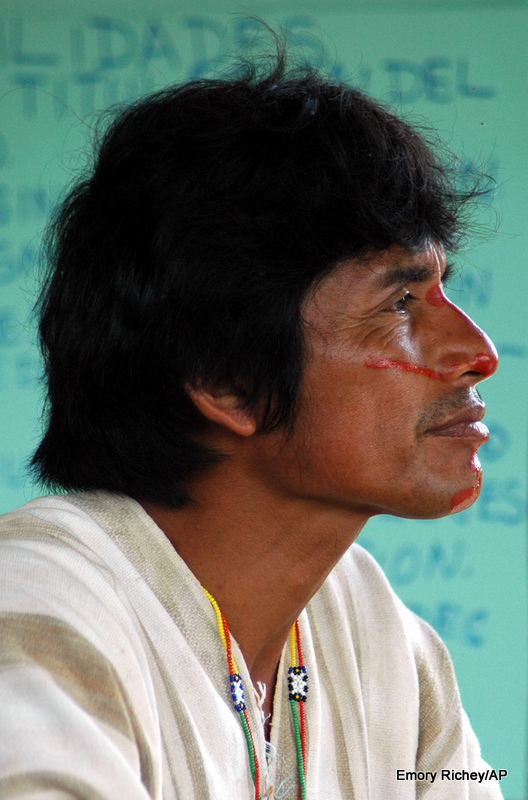
An outspoken Peruvian opponent of illegal logging and three other native Ashaninka community leaders were slain in a remote region bordering Brazil, tribal authorities said Monday.
The activist, Edwin Chota, had received frequent death threats from illegal loggers, who he had tried for years to expel from the lands for which his community was seeking title.
Illegal loggers were suspected in the killings, Ashaninka regional leader Reyder Sebastian Quiltiquari said by phone. Pervasive corruption lets the loggers operate with impunity, stripping the Amazon region’s river basins of prized hardwoods, especially mahogany and tropical cedar.
“He threatened to upset the status quo,” said David Salisbury, a professor at the University of Richmond who was advising Chota on the title quest and had known him for a decade. “The illegal loggers are on record for wanting Edwin dead.”
Chota, who was in his early 50s, and the others were killed about a week ago while returning to Saweto, the community he led on the Upper Tamaya river, from a meeting about the logging issue with Ashaninka leaders in the nearby Brazilian village of Apiwtxa, said Mr. Sebastian.
He said his information was still preliminary, but that a Saweto villager said via radio that the men’s dismembered bodies were found at the community’s edge. Chota would frequently confront firearms-carrying loggers, he added, a machete his only weapon.
The other slain men were identified by a police official in Pucallpa, the regional capital, as Jorge Rios, who was Chota’s deputy, Leoncio Quincicima and Francisco Pinedo.
Peru’s main indigenous federation, AIDESEP, expressed outrage at police and the judiciary in a statement for “doing absolutely nothing despite repeated complaints” to protect their brothers slain “defending their ancestral lands.”
A commission of indigenous leaders from Saweto’s district was expected later Monday in Pucallpa to meet with a government vice minister, said Mr. Sebastian. The police official, Carlos Quispe, said authorities later planned to fly by helicopter to retrieve the bodies.
Chota had campaigned for six years for the title for his community, emboldening other settlements along the Tamaya to similar seek legal claim to traditional lands, Mr. Sebastian said.
Now, he said, people in those communities fear for their lives. He said he would demand a meeting with President Ollanta Humala to obtain assurances for their safety.
Ashaninka are Peru’s No. 1 Amazon ethnic group, numbering some 92,000, and Mr. Sebastian says violence against them has been rising since they began agitating for titles to their territories.
Chota had written more than 100 letters to state institutions about illegal logging and titling efforts in Ucayali, said Mr. Salisbury, “and he was an incredible incredibly dynamic and charismatic leader who gave hope to not just his community but many others by his courage and convictions.”
He said he and Chota personally met with Peru’s national forestry director, Fabiola Muñoz, in July and that forestry inspectors had just visited forestry concessions that overlapped with Saweto that were being logged without permission.
Telephone calls to Ms. Muñoz seeking comment on the progress of Chota’s titling efforts weren’t immediately returned.
Chota’s region is home to about 80% of illegal logging in Peru, which thrives on a web of corruption involving the widespread issuance of counterfeit logging permits.
For years, said Mr. Salisbury, large amounts of timber have been taken from Saweto – and from the Brazilian side of the Tamaya River – and floated downriver to saw mills in Pucallpa.
“It’s impossible to monitor where the timber is coming from,” he said.
The wood from a single old-growth mahogany tree can fetch more than $11,000 on the U.S. lumber market, the nonprofit Environmental Investigation Agency said in a 2012 report on Peru’s troubled forest-concession system.

